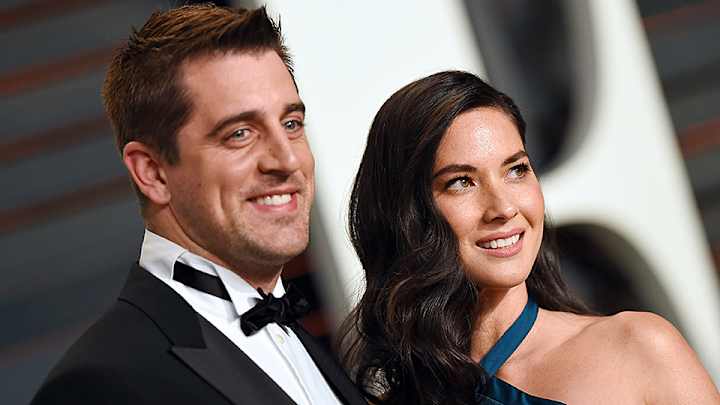Psychology behind fans blaming an athlete's love interest for struggles

As NFL quarterbacks go Green Bay’s Aaron Rodgers is the total package: sure armed, quick footed and so cool against the rush that even rival Chicago supporters have to give the man his props. A few—gasp!—even relate to the guy. “I think that’s a quality that I have,” said Bears fan-in-chief Barack Obama in a recent GQ interview, “not getting flustered [by] what’s around me.”
When Rodgers is in default mode (read: clicking), there isn’t a defender or another passer for that matter who can touch him. When he’s off his game, even slightly, it’s like a glitch in the Matrix. The search for explanations runs far and wide. No hypothesis is too extreme, not even the idea that it’s probably his girlfriend’s fault.
Black Monday Preview: Coaches on way out, candidates to replace them
Such was the conjecture during the early part of November, when Rodgers posted three career-worst performances as the Packers slid from the ranks of the league’s unbeaten to 7–3. Rather than consider the possible on-field root causes behind Rodgers’s slump—the injury absence of big play receiver Jordy Nelson, an embryonic play-calling relationship with associate head coach Tom Clements, the fact that two of those loses came against teams (Denver and Carolina) ranked in the top five in total defense—disenchanted Packers fans went right to Olivia Munn—a raven and gamine actress of Attack of the Show! and The Newsroom fame who has been a fixture at Rodgers’s side for about a year now.
You’d think this line of logic would wobble around the Twitterverse like a fumble skittering out of bounds, but no. The mainstream sports media quickly pounced on this. After the Packers dropped their second straight game, ESPN beat writer Rob Demovsky bounced the Munn hypothesis off of “a longtime NFL agent,” who offered that when one of his top clients underperform “the first thing he wonders is if something is going on in his personal life.” It’s hard to believe they were talking about the same quarterback that, just last season, had to shutdown homosexual rumors. (“I really, really like women,” Rodgers said last January, on a weekly radio show meant for deconstructing Xs and Os.)
Upon reading the ESPN report, Munn clapped back hard like Sloane Sabbith, the pedagogic financial journalist she played on Newsroom. “Playing it fast & loose w/the journalism @RobDemovsky,” she tweeted. “Your professional skills are lacking… you must be having personal problems at home.”
The whole episode wasn’t just another off-field drama. (Working title: “Attack of the Sideshow.”) It was yet another case of the Delilah Syndrome, a condition that renders the biased observer unable to accept a star athlete’s love life as anything other than a existential threat to rival an ACL injury or a drug suspension.
This year has been ripe for case studies...or at least arguments from fans on Twitter: Seahawks QB Russell Wilson hasn’t been his rock em, sock em self since taking up with the R&B singer Ciara. Serena Williams was on a roll until she got back together with Drake, who saw her bid for a grand slam come to a shocking end in the semifinal round of the US Open. Ronda Rousey had a perfect UFC record until she went public with her relationship with fellow fighter Travis Browne. Then Holly Holm knocked her out.
What’s more, also in November Lynn McHale—wife of Kevin, the Celtics great and former Rockets coach—blamed her husband’s recent firing on a “Kardashian curse.” (All-Star guard James Harden has been in a bit of a funk since he started dating the youngest sister of the three, Khloe, you see…) Not even the spouses themselves are immune from the Delilah Syndrome.
Then again, how could they be? For all of our modern advancements it’s still vastly easier to see the emotional connections that drive an athlete (the birth of a child, the death of a parent) than the deeper, more complex ones (a fear of failure, a pridefully concealed injury) that lurk just below the surface and are of far more significant consequence.
Arguments Beckham Jr. may raise in his appeal of one-game suspension
If the fans have a vulnerability, it’s that they care too much. “They perceive these players as theirs,” says Dr. Yolanda Bruce Brooks, a sports psychologist who once ran the mental health program for the Cowboys. “Anything or anyone perceived as distracting or potentially harmful to their player can trigger a sense of protectiveness and resentment in them. The price of their loyalty is meeting their expectations as they may feel entitled.”
They’ll ignore the many athletes who thrive on love. The Golden State Warriors’ Steph Curry sure seems like a different player since he got married and had a kid. The same goes for NASCAR’s Kyle Busch, who just rallied to Sprint Cup championship after sitting out the first three months of the season with a broken leg and foot. Tiger Woods hasn’t been the same golfer since he stopped, well, drinking in the love like so much Gatorade. Tom Brady, aka Mr. Gisele Bundchen, stays living that charmed life.
If Samson were slaying lions and armies in these times, the mere speculation about his relationship with Delilah would have him tearing his hair out. Such is the reality when an athlete dares to chase glory and romance and doesn’t achieve both in one fell swoop. Everybody loses.

Andrew Lawrence is an SI staff writer, specializing in motor sports for the website and magazine. Follow him on twitter @by_drew.